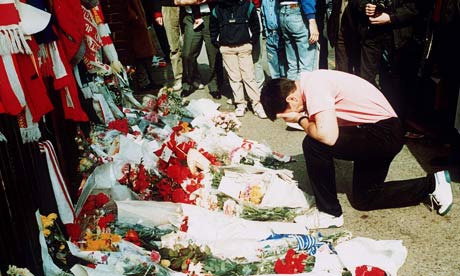Slide out of a taxi at Anfield and a figure will hand you a "Don't buy the Sun" leaflet while a familiar throng chats outside the Hillsborough Justice Campaign shop on Walton Breck Road. The disaster that cost 96 lives 22 years ago is so integral to the experience of attending a Liverpool match that the quest for the truth is part of the identity of the club.
The campaign was always there and always will be, or so it feels, as the chip shops do their lively trade and fans gather at the Hillsborough memorial or examine Bill Shankly's statue ("He made the people happy"). But the people can't be happy – not fully – until the system extends to the families of the dead the simple right to see all of the documents relating to events in Sheffield on 15 April 1989, when Steven Gerrard's 10-year-old cousin, Jon-Paul Gilhooley, was the youngest of the 96 who went to a football match and never came back.
There is no let-up in the antipathy to the Sun over its coverage of the tragedy. Kelvin MacKenzie, the paper's editor at the time, was on Newsnight recently, pontificating about rioters. His inability to distinguish 22 years ago between a disaster and a so-called outbreak of criminality as people lay dying on the Hillsborough pitch would, in a more discerning society, disqualify him from comment on the recent disorder across Britain. But the current Sun continues to carry the stigma of those times on Merseyside, just as the families persist with their demand for full disclosure.
The story so far is that an e-petition calling for previously hidden documents on Hillsborough to be released raced past 50,000 signatures this week and looks sure to acquire the 100,000 names needed to force the House of Commons backbench business committee to consider granting it time for debate.
On Wednesday, the Cabinet Office said it would appeal against a ruling by Christopher Graham, the Information Commissioner, who had approved a freedom of information request from the BBC to see the papers. The e-petition took off after Kenny Dalglish, the Liverpool manager, tweeted: "Think it is very important that we support this." Since that moment, Joey Barton has interrupted his flow of Friedrich Nietzsche quotations to urge his 428,000 followers to sign online.
The Commissioner argued that it would assist public understanding of the tragedy for the concealed documents to be released. But, in a statement, the government said: "The Cabinet Office absolutely agrees with the principle of providing information to families about the Hillsborough stadium disaster, but we believe it is important any release of information should be managed through the panel's processes and in line with their terms of reference."
The panel referred to is the independent body set up by the previous Labour government to examine the archive and decide on publication. But the panel was not in existence in 2009 when the request for access was first made. The BBC says the records include "reports presented to Margaret Thatcher [the then prime minister], correspondence between her office and that of the home secretary, Douglas Hurd, and minutes of meetings she attended."
For the neutral to find a position on this procedural wrangling, one has only to imagine how it must feel for the mother or father of a victim to be told, 22 years after the event, that they are not entitled to see words on pieces of paper that might release them from the torment of not knowing the full story of the defining day of their lives.
Across Merseyside, people wake and go back to sleep with a sense of injustice that stems partly from the original coroner's inquest, which imposed a cut-off for the examination of evidence at 3.15pm, a source of anger, still, to those who believe the role of the emergency services and the full timescale of death should have been part of Dr Stefan Popper's report.
In March, the Hillsborough panel said they would look at previously concealed documents. But you can see why the families object to the idea that a panel must decide what they can and cannot see. The system has piled years and years of additional needless cruelty on the Hillsborough families. The British obsession with secrecy and protection for those in power has stretched beyond all humane grounds the process of finding out, once and for all, what happened (and who was responsible) at an FA Cup semi-final in Sheffield more than two decades ago.
To most of us, the obvious truth is that this pain and indignation will hang over Liverpool until the books are laid out. This shame-inducing suppression of evidence serves no moral purpose. Nor can the campaign be fobbed off, as every politician must know by now. Its spirit pervades every aspect of Liverpool football club, to the point where Rafa Benítez's last act as manager was to donate £96,000 to the campaign.
The first e-petition to force a parliamentary debate called for convicted rioters to be deprived of state benefits. The state moves fast when it wants to punish and slowly when people want the truth.

No comments:
Post a Comment